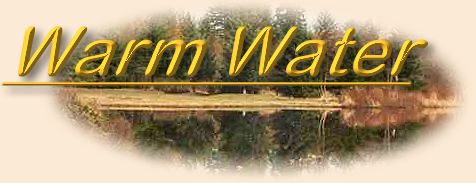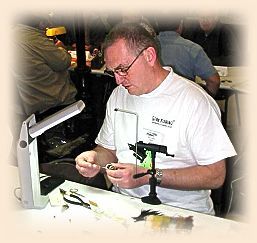|
I went out Saturday morning for my normal
"reviving of the soul" according to my wife.
I went to the pond that Joe Hyde and I went
to after he helped me with the anchoring system
on my canoe. First time I have been there this
year. The land is rented for haying and the
renter did not want people driving across the
grass. They had cut it and baled it last week
so I could go in.
I was able to drive to about 6 feet from the
pond. I could see activity all over the surface
of the pond. No wind and the water was as flat
as a mirror. I got everything into the canoe
and then took a minute to decide what to toss
at the fish. I have learned that it is better
to do this before I get on the water than after.
I went with a foam popper, with the midge dropper,
and with an unweighted fly that is a bugger
variation.
I cast the popper out first to see if anything
would take it. I did not have the canoe in the
water yet. I wanted to see if any fish would
take the popper or midge. I had several fish
swirls near both of these flies but they would
not take them. I cast the other fly out and had
a gill hit it immediately. This fish turned
sideways and tried to head for the other side
of the pond. Not having any luck with that the
fish headed for the weeds on the edge of the
shore. I managed to get the fish up a little
higher in the water column and that let me land
the fish without the line getting tangled in the
weeds.
If the fish were going to head for the weeds
then I needed to get out in the pond so I
could try to lead them away from the weeds
and not toward the weeds. I did change the
popper-midge to an unweighted olive peacock
sword tail nymph. I just had a feeling that
this might work better.
I put the canoe in slowly so as not to
disturb the water too much. I got in and
moved it out a little way, just enough
that I was setting at the edge of the
weeds. With no wind I did not need to
put down an anchor. I cast about 15 feet
to my left and let the fly just get under
the surface and started to bring it back.
I had moved the fly about 5 feet when the
water just opened up and the fly disappeared.
I knew it was a good sized bass and I wanted
to get it into my hands. I wanted to land it,
even though it would go back into the pond.
I grabbed the paddle and pushed the canoe
out into the pond so I would be away from
the weed edge to fight the fish. Wouldn't
you know it was the 7 ft 3 wt with a 5X
tippet on it. I knew I could not horse
the fish, but I had to keep it away from
the weeds.
It was a constant battle to keep the fish
away from the weeds. Many times I had the
rod tip down near the surface of the water
to turn the fish away from the weeds.
Whenever I got the fish to head toward
the middle of the pond, I would grab the
paddle and move the canoe out a little
farther from the shore. I figured the
more space the easier it would be to
land the fish. I finally got the fish
to start circling the canoe. I was not
gaining much line, but I was not losing
it either. Finally I started to exert
some control over this fish. I could
start to gain some line and was figuring
out the best place to land her. She finally
took care of this as she started to swim at
me. I grabbed line fast and got her head up
on the surface and just let her come at me.
When she was close, I lipped her and took her
out of the water for a minute. I know the
separations of the line guides on this rod,
one I built, so I measure fish according to
these. This one came out to be about 22
inches long. The best bass I have caught
in this pond. In fact I did not know this
pond had fish this size in it. I put her
back in and moved her back and forth to put
some water over the gills. As soon as I felt
her tugging against my hand, I let her go
and watched her swim away.
I figured this water was somewhat disturbed
and that I should fish some of the water the
bass had not disturbed. I cast the fly out
into the water and started slowly stripping
it back. About half the time I would get a
gill to hit the fly somewhere in the retrieve.
I did this with both flies, as I am always
curious to see if it is the pattern or the
presentation. I did catch several gills doing
this.
In fighting the gills I moved to near the
weed edge again so I cast a fly there. I
let it drop a second and then started to
retrieve it. The fly had barely moved when
the line just took off. I clamped down on
the line a little to set the hook better
but for the most part just let the fish run.
This one headed for the middle of the pond
and that is where the fight took place. I put
just enough pressure on the fish to get her
to swim in a circle. I let her do this until
she tired and I then tried to get some line
back in. Again the fish had hit while I was
casting the 3 wt. I finally got her in and
she was a carbon copy of the first bass I
had caught.
I was curious and cast up near the shore
again. I had another small bass hit the
fly. I did this four more places along the
shoreline. Now it was beginning to sink in.
If I fished the weed edges, I caught bass.
If I fished in the middle of the pond then
it was gills.
I headed back out to the middle and cast
for the gills. I still like catching crappie
and gills more than I do bass. I was getting
a fish about every third cast now. The sun
was higher in the sky and I had to let the
fly drop a little deeper.
I had some other things to get done at home,
so I decided to let the fish grow bigger for
the next time I come back. It was fun to get
the bass and to know that the pond had some
good sized fish in it. They will help control
the number of gills that are in the pond. The
pond owner did not know that he had any fish
of that size in the pond.
I got home, got the gills filleted and
then started on the necessary jobs. The
fishing was more fun, but the other things
must be done.
Hope you can get out on the water. ~ Rick
|




